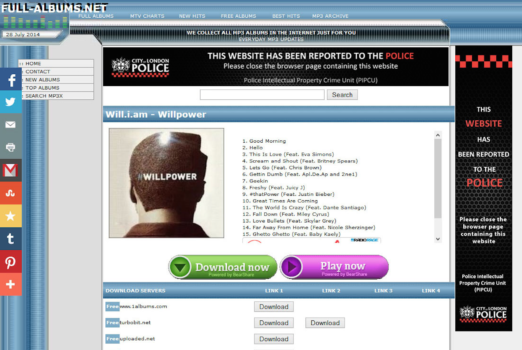Police Crackdown On Piracy Continues With Ad Replacement
by on 29th Jul 2014 in News

The City of London Police have moved to further starve online pirates of ad funding by replacing display ads on copyright-infringing sites with official banners from the force, as part of its ongoing battle with more nefarious elements of the ad tech industry.
The Police Intellectual Property Crime Unit (PIPCU) at the City of London Police is now replacing a wide range of legitimate brand adverts on copyright-infringing websites with banners advising visitors to exit the page, as it is under investigation as part of its piracy crackdown.
The sites where the new banners will feature have been identified by copyright holders who then provide evidence of the copyright infringement to PIPCU.
Ad replacement proces
The unit then evaluates the reported websites as part of its Operation Creative initiative, and then contacts the site owners (if they are found to be infringing copyright laws) and offers them the opportunity to begin operating legitimately.
However, if a website fails to comply and engage with the police a variety of other options may then be employed including: seeking suspension of the site from the domain registrar, or the advert replacement (see image), which would also involve the website being registered on the the Infringing Website List (IWL).
In a press release noting the development, Andy Fyfe, DCI, head of PIPCU, said the removal of the brand advertising from any offending site would remove the “look of legitimacy” and further dent criminal activity.
“Copyright infringing websites are making huge sums of money though advert placement, therefore disrupting advertising on these sites is crucial and this is why it is an integral part of Operation Creative,” he added.
Operation Creative forms part of a wider cross-industry initiative between copyright holders, advertisers and online advertising firms, as well as PIPCU, to help bolster transparency in the use of ad tech, as well as protect the interests of the creative community.
This includes the long-awaited establishment of the Digital Trading Standards Group (DTSG), which includes the drawing-up of both ‘white-‘ and ‘blacklists’ where advertisers draw up a list of sites where they don’t want their ads to appear with companies such as online security firm Project Sunblock, which work with PIPCU on the ad replacement service.
Duncan Trigg, Project Sunblock, CEO, said: “Without realising it, advertisers are allowing their brands to be associated with illegal sites, and regrettably, this happens more often than it should.
“But each time it does, brands are effectively putting money in the back pocket of criminals. As advertisers funnel more money into online spend, initiatives like this are crucial to safeguarding their brands as well as their budget.”
Operation Creative
Operation Creative is a unique partnership between the City of London Police and the UK advertising industry (represented by the IAB, brand-side marketer body ISBA, as well as the IPA.
Copyright holders groups included in the initiative include: FACT (Federation Against Copyright Theft), BPI (British Recorded Music Industry), IFPI (International Federation of the Phonographic Industry) and The Publishers Association.
Earlier this year Nick Stringer, IAB UK, head of director of regulatory affairs penned a piece for ExchangeWire detailing the complications of determining whether or not a site is infringing copyright.
“With a deficit of a common interpretation of what infringement looks like, the ad industry has – historically – not been able to respond collectively to calls from the creative industries community to pull display advertising from copyright infringing sites.
“Today the UK digital advertising industry is close to receiving a single, definitive and authoritative source of information about copyright infringement via what is known as the IWL [from PIPCU].
“Working in real-time, this will offer protection to brands in addition to ensuring that those who have resolved their infringement case are removed from the IWL.
“However, there is still work to do… This requires that advertisers and their agencies request the use of the IWL as part of their display ad trading agreements, and – in time – by working with DTSG compliant businesses. It is through these actions that advertisers can be assured of transparency in ad trading and a reduced risk in placement against IWL content.
This approach is not a magic bullet to the problem: it will never stop display advertising particularly when it is out of the control of reputable market players, for example those that promote malware or click fraud. However, this is a test case for other markets keen to tackle the issue of infringing copyright in a digital age.”
Ad FraudAd VerificationAdvertiserBrandingDigital MarketingDisplayM&AMartechMedia SpendTargetingTrading








Follow ExchangeWire